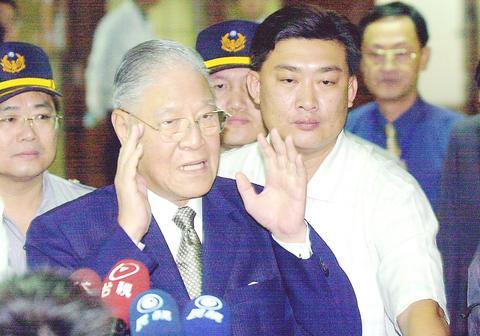Former president Lee Teng-hui (李登輝) reportedly told Taipei prosecutors yesterday that People First Party Chairman James Soong (宋楚瑜) did embezzle money from the Chinese Nationalist Party (KMT).
Lee testified yesterday at a close-door investigative hearing chaired by Taipei Chief Prosecutor Lin Bang-liang (林邦樑) and Prosecutor Meng Ling-shih (孟令士).
The hearing was scheduled to begin at 9:30am, but Lee arrived at the Taipei District Prosecutors' Office around 8:40am, wanting to begin earlier.

PHOTO: FANG PIN-CHAO, TAIPEI TIMES
When approached by reporters when he walked out of the prosecutors' office's interrogation room No. 1 around noon, Lee said that he would not disclose what he told prosecutors.
"Nobody is supposed to make public any information from an investigative hearing, so I won't," Lee said.
However, Taiwan Solidarity Union (TSU) Legislator Chien Lin Hui-chun (
"This testimony was endorsed by Lee," she said, showing reporters a document which she then read from.
According to Chien Lin, Lee told prosecutors that Soong opened a "secretary-general's account" at the Bank of Taiwan on Sept. 17, 1991 without any authorization from the party.
Soong was secretary-general of KMT at the time. The account was reportedly set up to accept donations to the KMT.
According to Chien Lin, Lee said Soong opened another secret account, that same day and for the same purpose, at the Chung Hsing Bills Finance Corp -- again without informing him beforehand.
She said Lee told prosecutors that between Sept. 17, 1991 and March 10, 1993, NT$360.88 million in donations was deposited into the two accounts, but that he had not been told of donations even though he was the president and chairman of the KMT.
"Soong left his post holding the money in 1993 since Hsu Shui-teh (
Lee's testimony yesterday was the second time he has talked to prosecutors since a new investigation into Soong and the Chung Hsing account was launched in March.
The investigation was begun based on information that Chuang Po-lin (莊柏林), a lawyer for the KMT, provided to prosecutors when they announced, on Jan. 20, 2001, their decision not to prosecute Soong in connection with what had become known as the Chung Hsing Bills scandal.
At the time, Chuang described what he gave the prosecutors' office as "new evidence."
When contacted by the Taipei Times by phone yesterday, Chuang said that Soong's not being honest with him was what upset Lee the most.
"I can understand how he [Lee] felt," Chuang said.
Lee's attendance at yesterday's hearing was his first appearance at a prosecutors' office and the first time a former president has replied to a summons to a prosecutors' office.
He was earlier interrogated by prosecutors at his residence in Tahsi, Taoyuan County, on March 26.
"Lee is a former president. We would respect his requests when necessary but he has not asked for any special prerogatives nor is he being given any," said Chen Hung-ta (
By law, only the summoned person and his or her lawyer are allowed to enter an interrogation room for a close-door investigative hearing.
For security reasons, however, the prosecutors' office also allowed Lee's security guards to be in the room as well.
Also See Story:
TSU says Soong protecting sister-in-law

The CIA has a message for Chinese government officials worried about their place in Chinese President Xi Jinping’s (習近平) government: Come work with us. The agency released two Mandarin-language videos on social media on Thursday inviting disgruntled officials to contact the CIA. The recruitment videos posted on YouTube and X racked up more than 5 million views combined in their first day. The outreach comes as CIA Director John Ratcliffe has vowed to boost the agency’s use of intelligence from human sources and its focus on China, which has recently targeted US officials with its own espionage operations. The videos are “aimed at

STEADFAST FRIEND: The bills encourage increased Taiwan-US engagement and address China’s distortion of UN Resolution 2758 to isolate Taiwan internationally The Presidential Office yesterday thanked the US House of Representatives for unanimously passing two Taiwan-related bills highlighting its solid support for Taiwan’s democracy and global participation, and for deepening bilateral relations. One of the bills, the Taiwan Assurance Implementation Act, requires the US Department of State to periodically review its guidelines for engagement with Taiwan, and report to the US Congress on the guidelines and plans to lift self-imposed limitations on US-Taiwan engagement. The other bill is the Taiwan International Solidarity Act, which clarifies that UN Resolution 2758 does not address the issue of the representation of Taiwan or its people in

US Indo-Pacific Commander Admiral Samuel Paparo on Friday expressed concern over the rate at which China is diversifying its military exercises, the Financial Times (FT) reported on Saturday. “The rates of change on the depth and breadth of their exercises is the one non-linear effect that I’ve seen in the last year that wakes me up at night or keeps me up at night,” Paparo was quoted by FT as saying while attending the annual Sedona Forum at the McCain Institute in Arizona. Paparo also expressed concern over the speed with which China was expanding its military. While the US

SHIFT: Taiwan’s better-than-expected first-quarter GDP and signs of weakness in the US have driven global capital back to emerging markets, the central bank head said The central bank yesterday blamed market speculation for the steep rise in the local currency, and urged exporters and financial institutions to stay calm and stop panic sell-offs to avoid hurting their own profitability. The nation’s top monetary policymaker said that it would step in, if necessary, to maintain order and stability in the foreign exchange market. The remarks came as the NT dollar yesterday closed up NT$0.919 to NT$30.145 against the US dollar in Taipei trading, after rising as high as NT$29.59 in intraday trading. The local currency has surged 5.85 percent against the greenback over the past two sessions, central